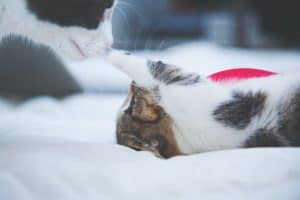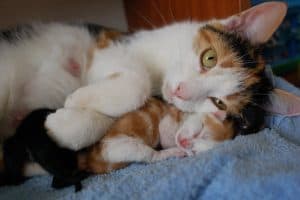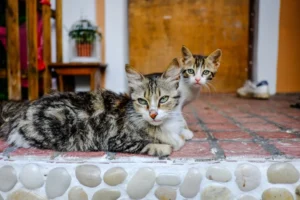Kittens are adorable creatures that constantly keep us on our toes with their curious behaviors. One common behavior that many kitten owners may notice is their relentless search for milk. But why is your kitten always looking for milk? Let’s find out.
Your kitten is looking for milk as it is a natural instinct stemming from their early days of nursing.
Why do kittens crave milk?
Kittens have an innate desire for milk that stems from their early days of nursing from their mother. This instinct to seek out milk serves as a source of comfort and nourishment for them, even as they grow older and are weaned off their mother’s milk. So, if you find your furry friend searching for milk, it’s completely normal and natural.
Interestingly, a kitten’s keen sense of smell plays a significant role in this behavior. The scent of milk can trigger positive feelings and associations in kittens, similar to how certain scents evoke memories for us humans. This powerful olfactory response explains why kittens often go on a mission to find milk, even if they no longer require it for their nutrition.
If you notice your kitten looking for milk, it’s essential to understand that this behavior is deeply ingrained in their biology. Providing alternatives to satisfy their cravings, such as special kitten-formulated milk, can help fulfill this instinctual need without compromising their health.
Is it safe to give kittens cow’s milk?
While the image of a kitten lapping up a bowl of cow’s milk may seem adorable, it’s important to consider the potential risks involved. Contrary to popular belief, cow’s milk is not an ideal substitute for a kitten’s nutritional needs.
Cow’s milk lacks essential nutrients that are crucial for a growing kitten’s development. Additionally, many kittens have difficulty digesting lactose, the sugar present in cow’s milk, which can lead to digestive issues such as diarrhea. So, despite the allure of offering your kitten a taste of regular milk, it’s best to opt for specially formulated kitten milk replacers.
One effective alternative to cow’s milk is goat’s milk, which is gentler on a kitten’s stomach and provides a closer nutritional profile to their mother’s milk. When it comes to nurturing your kitten’s health and well-being, choosing the right milk replacement is paramount in ensuring they receive the proper nourishment they need to thrive.
For more information on safe dietary options for your kitten, check out this helpful resource on kitten nutrition: Kitten Nutrition Guide
How to properly wean kittens off milk
Alright, so your little furball is on the hunt for milk all the time, huh? It’s time to help them transition to solid foods like the sophisticated cat they are becoming. First things first, start mixing a bit of wet kitten food with milk replacement formula to create a slushy mixture. Gradually increase the ratio of food to milk over a week or so until they are fully on solid food. Remember, patience is key here – don’t rush the process!
Now, here’s a pro-tip for you – try introducing a variety of kitten-friendly foods to expand their palate and ensure they are getting all the nutrients they need. And as always, keep an eye on their weight and overall health during this transition period. If you notice any unusual changes, consult with your vet to make sure everything is on track.
Extra tip: To make the weaning process smoother, consider warming the kitten food slightly to enhance its aroma and make it more appealing to your little buddy.
Signs that your kitten may have a milk allergy
Hey there, if your kitten seems to be constantly seeking out milk but is experiencing some not-so-great symptoms, they might have a milk allergy. Keep an eye out for signs like diarrhea, vomiting, itchy skin, or even difficulty breathing. These could all be indicators that your furry friend is not tolerating milk well.
If you suspect a milk allergy, don’t worry – there are plenty of milk alternatives available that can still provide the essential nutrients your kitten needs. Consider trying out lactose-free milk, goat’s milk, or specialized kitten formulas that are designed for sensitive tummies. And of course, always consult with your vet for proper diagnosis and guidance on the best course of action.
Remember, every kitten is unique, so it’s essential to pay attention to their individual needs and preferences when it comes to their diet. Keep a close watch on how they respond to different foods and make adjustments accordingly to ensure they stay happy and healthy.
Alternative sources of nutrition for kittens
If your kitten is no longer seeking milk, you might be wondering what else you can feed them. Don’t worry, there are plenty of options to ensure they are getting all the nutrients they need. High-quality kitten food is a great choice, as it is specially formulated to meet their nutritional needs. Additionally, wet food can provide extra hydration, which is essential for your kitten’s health. Cooked meats such as chicken or turkey (without any seasoning) can also be a tasty and nutritious option. Remember to avoid feeding your kitten human food that may not be safe for them, like onions or chocolate. For a unique and specific insight, consider specially formulated kitten milk replacers. These products mimic the composition of a mother cat’s milk and can be a great alternative for kittens who are no longer nursing.
The role of water in a kitten’s diet
Hydration is key to keeping your kitten healthy and happy. Water plays a crucial role in your kitten’s diet, helping them digest food, regulate body temperature, and eliminate waste. Always make sure fresh water is available to your kitten at all times. If your kitten doesn’t seem interested in drinking, try a shallow water dish or a cat water fountain to pique their interest. Wet kitten food can also contribute to their overall hydration. Remember, a well-hydrated kitten is a happy kitten! For an additional tip, consider mixing a little water into your kitten’s wet food to ensure they are getting enough hydration throughout the day.
When to consult a veterinarian
If your kitten seems to be constantly searching for milk despite being weaned, it may be a sign of an underlying issue. This behavior could indicate nutritional deficiencies, digestive problems, or even potential health concerns. If you notice your kitten exhibiting this behavior, it’s essential to consult a veterinarian promptly. They can provide expert guidance on your kitten’s diet and overall health, ensuring they receive the necessary care and nutrition they need to thrive. Remember, your veterinarian is your best ally in keeping your furry friend happy and healthy!
Key Tip: Always monitor your kitten’s behavior and consult a veterinarian if you notice any unusual signs or symptoms, including excessive milk-seeking behavior.
Extra Tip: Signs to Watch For
In addition to constant milk-seeking behavior, keep an eye out for other signs that may indicate a problem with your kitten’s diet or health. These signs could include persistent diarrhea, vomiting, lethargy, or a noticeable decline in appetite. If you observe any of these symptoms alongside your kitten’s milk-seeking behavior, it’s crucial to seek veterinary guidance promptly. Early intervention can help address any issues and ensure your kitten receives the appropriate care and treatment. Remember, your kitten’s well-being is always a top priority.
Key Tip: Trust your instincts as a pet owner. If something seems off with your kitten, don’t hesitate to reach out to a professional for advice and support.
Alex, a passionate animal lover, has experience in training and understanding animal behavior. As a proud pet parent to two dogs and three cats, he founded AnimalReport.net to share insights from animal experts and expand his knowledge of the animal kingdom.









